|
|
|
Sort Order |
|
|
|
Items / Page
|
|
|
|
|
|
|
| Srl | Item |
| 1 |
ID:
171339
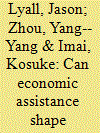

|
|
|
|
|
| Summary/Abstract |
Governments, militaries, and aid organizations all rely on economic interventions to shape civilian attitudes toward combatants during wartime. We have, however, little individual-level evidence that these “hearts and minds” programs actually influence combatant support. We address this problem by conducting a factorial randomized control trial of two common interventions—vocational training and cash transfers—on combatant support among 2,597 at-risk youth in Kandahar, Afghanistan. We find that training only improved economic livelihoods modestly and had little effect on combatant support. Cash failed to lift incomes, producing a boom-and-bust dynamic in which pro-government sentiment initially spiked and then quickly reversed itself, leaving a residue of increased Taliban support. Conditional on training, cash failed to improve beneficiaries’ livelihoods but did increase support for the Afghan government for at least eight months after the intervention. These findings suggest that aid affects attitudes by providing information about government resolve and competence rather than by improving economic livelihoods.
|
|
|
|
|
|
|
|
|
|
|
|
|
|
|
|
| 2 |
ID:
093410
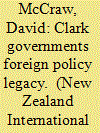

|
|
|
| 3 |
ID:
147251
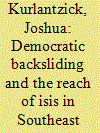

|
|
|
|
|
| Summary/Abstract |
Governments in Southeast Asia have adopted policies that are fueling militancy by restricting freedoms and fostering authoritarianism
|
|
|
|
|
|
|
|
|
|
|
|
|
|
|
|
| 4 |
ID:
086750


|
|
|
|
|
| Publication |
2009.
|
| Summary/Abstract |
Under which conditions and to what extent do governments pursue unpopular social policy reforms for which they might be punished in the next election? This article shows that there exists substantial cross-cabinet variation in the degree to which governments take unpopular measures and argues that current studies cannot adequately explain this variation. Using insights from prospect theory, a psychological theory of choice under risk, this study hypothesises that governments only engage in unpopular reform if they face a deteriorating socio-economic situation, a falling political position, or both. If not, they shy away from the risk of reform. A fuzzy-set Qualitative Comparative Analysis (fs/QCA) of the social policy reform activities pursued by German, Dutch, Danish and British cabinets between 1979 and 2005 identifies a deteriorating socio-economic situation as necessary for unpopular reform. It is only sufficient for triggering reform, however, if the political position is also deteriorating and/or the cabinet is of rightist composition. This study's findings further the scholarly debate on the politics of welfare state reform by offering a micro-foundation that helps one to understand what induces political actors aspiring to be re-elected to engage in electorally risky unpopular reform.
|
|
|
|
|
|
|
|
|
|
|
|
|
|
|
|
| 5 |
ID:
093089
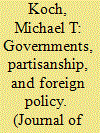

|
|
|
|
|
| Publication |
2009.
|
| Summary/Abstract |
Do variations in partisanship and political outcomes among democratic states affect the duration of militarized interstate disputes? To answer this question, the author develops a model of partisan competition derived from the government failure literature. The author argues factors associated with government failure determine the ability of governments to contend with the domestic political costs of militarized disputes, specifically the duration of those disputes. The author tests his expectations using hazard analysis on a dataset of 20 democratic governments and militarized disputes between 1945 and 1992. The results suggest the outcome of party competition in the form of a government's sensitivity to the potential political costs of conflict is an important part of the conflict process. The author concludes that differences in domestic political outcomes influence the duration of militarized interstate disputes. Governments that are politically more secure in their tenure engage in longer disputes. Alternatively, governments that are more vulnerable have significantly shorter disputes. In addition, because government partisanship contributes to vulnerability, it also affects dispute duration, with governments of the left engaging in shorter disputes, while governments of the right fight longer disputes.
|
|
|
|
|
|
|
|
|
|
|
|
|
|
|
|
| 6 |
ID:
171042
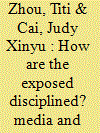

|
|
|
|
|
| Summary/Abstract |
Authoritarian governments are believed to tolerate media exposure of malfeasant agents to hold them accountable. This line of argument is based on the strong assumption that erring agents will be duly disciplined once their malfeasance is known to their superiors. This study tests this assumption by examining how the Chinese government responds to exposed agents. It finds that media exposure conditionally contributes to the discipline of agents. Exposed agents may be punished when their malfeasance gains high publicity, especially when the malfeasance falls under the high-priority concerns of the government. Hence, while media exposure constitutes a form of third-party monitoring, the discipline of exposed agents is conditional.
|
|
|
|
|
|
|
|
|
|
|
|
|
|
|
|
| 7 |
ID:
129680


|
|
|
|
|
| Publication |
2014.
|
| Summary/Abstract |
International sporting competition has played a rôle in diplomacy since at least the ancient Olympiad. Competitors in international sporting events have always possessed the capacity to represent their governments and peoples-and, more latterly, sponsoring firms-not only to foreign governments but also to foreign populations and the global public more broadly. The rapid increase in the number and variety of international sporting competitions over the past 50 years has seen "the increase in people-to-people exchanges, both virtual and personal, across national borders." The communicative power of international sport has increased dramatically by the information and communications technologies revolution over the past several decades, enabling the audience for major sporting events to expand to hundreds of million people. Yet, little study on how international sport relates to public diplomacy has occurred and remains not well understood. This analysis fills in this lacuna.
|
|
|
|
|
|
|
|
|
|
|
|
|
|
|
|
| 8 |
ID:
123622
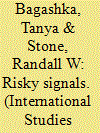

|
|
|
|
|
| Publication |
2013.
|
| Summary/Abstract |
It can be risky for governments to renege on exchange rate commitments, but it is misleading to characterize the costs as audience costs. While an audience costs approach assumes that the punishment for reneging is automatic, we model the choice of exchange rate policy in the shadow of elections as a signaling game between voters and governments, where governments have private information and voters are rational. We find that voters draw different inferences when they see reneging by different actors, and only Left governments are punished for breaking their promises. We test this hypothesis in the context of the post-Communist countries from 1990 to 2007 and find that Left governments were more likely to fall if they reneged on exchange rate commitments, but Right governments were not.
|
|
|
|
|
|
|
|
|
|
|
|
|
|
|
|
| 9 |
ID:
181352


|
|
|
|
|
| Summary/Abstract |
THE COVID-19 pandemic, which began as just another routine outbreak of infection in a region where many other virus infections are endemic (for example, influenza), became in a matter of months a global medical challenge to states and international institutions and a threat in many other respects [2].
|
|
|
|
|
|
|
|
|
|
|
|
|
|
|
|
| 10 |
ID:
053706
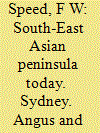

|
|
|
|
|
| Publication |
Sydney, Angus and Robertson Ltd., 1970.
|
| Description |
87p.pbk
|
| Standard Number |
0207120129
|
|
|
|
|
|
|
|
|
|
|
|
Copies: C:1/I:0,R:0,Q:0
Circulation
| Accession# | Call# | Current Location | Status | Policy | Location |
| 009025 | 959/SPE 009025 | Main | On Shelf | General | |
|
|
|
|
| 11 |
ID:
090611


|
|
|
| 12 |
ID:
170588


|
|
|
|
|
| Summary/Abstract |
The policies and collaborations between governments and civil society that kept forests standing in many parts of Amazonia have come to an end, at least for now.
|
|
|
|
|
|
|
|
|
|
|
|
|
|
|
|
|
|
|
|
|